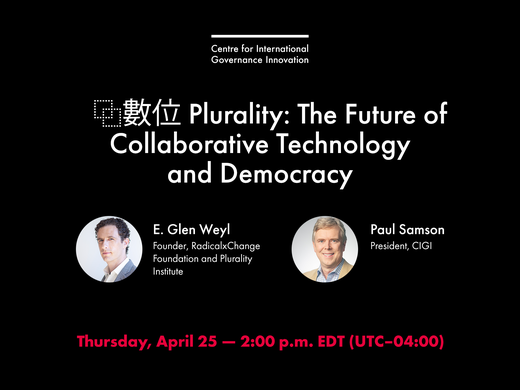We have entered a new era of space “exploitation,” so fundamentally different from past eras of space exploration. The new space age features a wide diversity of space actors, both nation-state and private sector. Technological opportunities mean that space has emerged as a new critical infrastructure environment — one that is not earthbound. The diversity of space actors and advances in technology have meant a growing reliance on fragile cyber systems to make peaceful space exploitation sustainable and secure.
Space exploitation opens immense benefits for global society that range from wider and more equitable access to telecommunications services, more precise navigational aids for global movement and a capacity to better monitor the global impacts of climate change, to new possibilities for arms control, and monitoring and resolution of conflicts. Space-based platforms will be vital to the digital life environment coming with the Internet of Things.
New opportunities and societal benefits come with attendant risks. One concerns the technological and political challenges that face the existing global governance framework for maintaining a safe, secure and sustainable environment in space for all. Another intersecting issue concerns the vulnerabilities that now exist with space systems that may lack resilience — vulnerabilities that are especially pronounced in the face of cyberthreats and intrusions.
There is a volatile “space-cyber nexus” that commands our urgent attention. In early 2022, the World Economic Forum highlighted “digital dependencies and cyber vulnerabilities” alongside “crowding and competition in space” as key threats facing our world today (World Economic Forum 2022, chapters 3 and 5). A few months later, we witnessed these threats collide in Ukraine as satellite services for broadband internet proved essential for warfighting and the ability of the Ukrainian military to resist a Russian invasion, and became a target of digital disruption and denial activities that had rippling effects on civilians far beyond the conflict.
Exploring this space-cyber nexus is the idea that animates this essay series.
A diverse group of experts offer a variety of perspectives on a common challenge. Three key themes stand out.
One theme concerns the pursuit of space security and the mitigation of vulnerabilities and risks. Although things that go “boom” have previously received the greatest attention in discussions of outer space security, essays in this series make clear the persistent and ubiquitous threat posed by capabilities to exploit digital weaknesses in space systems. Not unlike space debris, vulnerability to malicious cyber activities is universal, although operational capabilities to detect, mitigate and respond to such harm vary. The scope of this vulnerability is vast, stretching across the space, communications and ground segments of space systems, to assembly lines, supply chains and the human element.
Readers with a particular interest in this theme can explore essays by Jessica West, Wesley Wark, Robert Mazzolin, Brian Gallant and Jordan Miller, Victoria Samson and Laetitia Cesari. What unites these essays are explorations of the intersection between space security and cybersecurity for a wide variety of entities, from multilateral networks, to states, the private sector and human actors.
Responsiveness to the nature of cyberthreats is key.
A second major theme concerns the state of international governance, laws and norms as the new age of space exploitation gathers speed. Responsiveness to the nature of cyberthreats is key.
Such threats can lay dormant and remain undetected until their effects are clear. The relative ease of access to malicious cyber activities by a broad range of global actors is another notable feature. Cyberthreats can be military in nature but can also include criminal hacking, intelligence-led operations and insider threats.
The expansive and non-kinetic nature of harmful cyber activities in space means that they are generally considered below the threshold of warfighting. Yet “below threshold” does not mean unimportant or lacking in danger. Cyber activities can generate unpredictable and escalatory effects.
Regardless of origin or intent, malicious cyber activity against space systems can have unpredictable effects, including on users or services far removed from an initial target. The integration of space systems — including an increasing number of commercial capabilities — with warfighting functions and weapons systems on Earth, as well as with intelligence-gathering and Earth-observation capacities, means that relatively benign interference has the potential to escalate to kinetic violence.
There exists a well-defined body of space law. It is also clear that general international law — including international humanitarian law — applies to both outer space and cyberspace. Yet the nexus of these two legal domains can create a grey zone where the application of law or legal concepts is unclear or lacking.
Law contributes to, but is not sufficient for, governance. The multifaceted nature of cyber vulnerabilities and threats, the multi-use nature of most space systems, and the interconnectedness of space-based capabilities with terrestrial services and critical infrastructure mean that coordination and cooperation across geographically dispersed operators, and between commercial and government sectors, is essential. But despite this awareness, essays in this series make clear that such cooperation remains challenging, even within a single country or among allies. At the global level, this challenge is compounded by differing conceptual understandings and perceptions of threats.
Essays by Aaron Shull and Timiebi Aganaba, Tobby Simon, Cassandra Steer, Gregory Falco and Almudena Azcárate Ortega explore this theme further. The authors explore the current state of governance, the gaps that exist, and the importance of refining our normative and international law approaches to maintaining peace and stability in space.
A third and important theme concerns the need for more inclusive governance. Access to space is no longer a luxury: it is essential for all people and all countries. There must be greater participation and more opportunities for the Global South, as well as for diverse societal groups, in the exploitation of space. More than ever, commercial operators across the globe must be a part of space security governance.
Aya Iwamoto and Quentin Verspieren provide a perspective on Japanese outlooks, Rajeswari Pillai Rajagopalan examines Global South attitudes, Yue Yuan looks at Chinese thinking on the space-cyber nexus and Giulia Pavesi considers the implications for the North Atlantic Treaty Organization alliance.
Going forward, the series raises critical questions for new policy discussions and research across all three of the highlighted themes. New developments in space security and their nexus to cybersecurity should be watched, and there should be an effort to find effective ways to enhance the peaceful exploitation of space through governance, laws and norms. We must see the new space age as a global concern, not the competitive playground of a handful of great powers.
When we look to space, we now see an environment full of opportunities to enhance life on Earth. But there is much work to be done to understand and realize those opportunities, and much work to be done to ensure the security, sustainability and resilience — especially in the face of potential cyberthreats — of all that we are building and will build in Earth’s orbit.



























